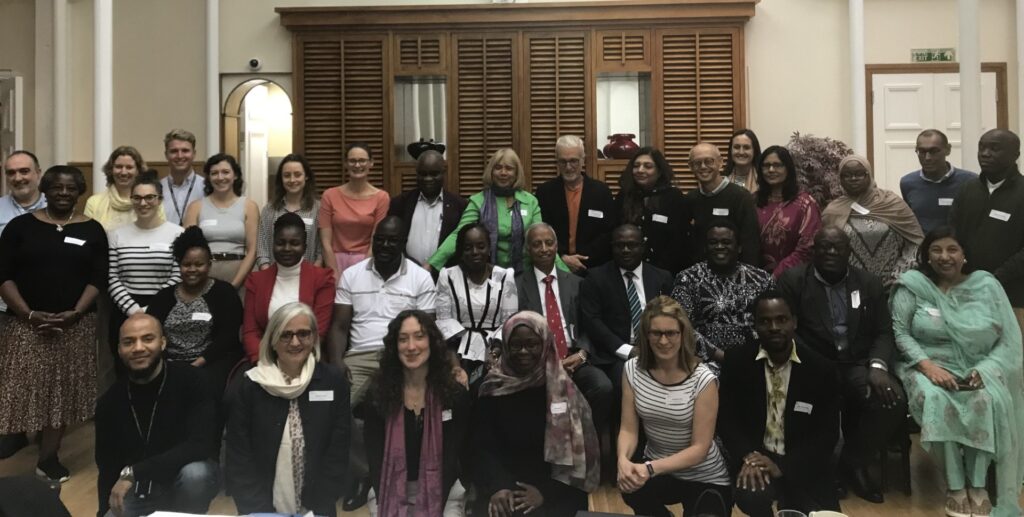“Some of the most disadvantaged women took part in the WOMAN-2 Trial. They shared their experiences with us so that we could learn from them.
“This is why we’ve been obsessive about the trial data. We want the results and our papers to pay respect to the trial, to the data and to the women who took part.”
This is how Professor Ian Roberts, co-lead of the WOMAN-2 Trial, kicked off our three-day WOMAN Trials meeting in London at the beginning of the month.

It was a unique opportunity to bring together the global team from Pakistan, Nigeria, Tanzania and Zambia who have worked tirelessly to make the WOMAN-2 Trial happen over the past five years.
The institutions and hospitals represented included Shifa Tameer-e-Millat University in Pakistan, Mbeya and Mwananyamala Hospitals in Tanzania, University of Ibadan in Nigeria and the University Teaching Hospital in Lusaka, Zambia. To have everyone in the same room to share thoughts, ideas and feedback was a privilege.
The main aims of the meeting were to discuss the trial results, finalise the manuscript and talk about how we disseminate the results, once published.
Indeed, we started with a comprehensive review of the participant characteristics and clinical trial data from Raoul Mansukhani and Eni Balogun, respectively. This led to lots of interesting discussion and interpretation of the data.
In the afternoon, we welcomed a special guest, Cheng-Hock Toh – a professor and consultant in haematology at the University of Liverpool & Liverpool University Hospitals NHS Foundation Trust. This was to discuss the particular haematological make-up of the women in the trial, who were all moderately or severely anaemic. Ian Roberts and Judith Lieber also presented ideas and data on disseminated intravascular coagulation (DIC) and DIC-causing conditions in anaemic women.
We then zoomed out and finished the day by looking at the broader picture and other trials that have used tranexamic acid (TXA) for the treatment of postpartum haemorrhage (PPH). Katharine Ker presented her individual patient data meta-analysis on this topic, which inspired many questions and a lot of lively debate.
The morning of the second day was dedicated to reviewing the draft manuscript for submission. The writing team presented the draft; with the wider group conducting a thorough review to ensure clarity, accuracy, and completeness. Contributions from the whole team were integrated to enhance the quality of the manuscript.
The views and opinions of the writing committee members, particularly those from the trial countries themselves, were essential and led to some major and important changes to the draft.
In the afternoon, we switched focus and discussed disseminating the trial results. Sarah Marzouk presented a draft advocacy strategy and asked for feedback from the wider group. She also showed some examples of advocacy and communications materials including two films on maternal anaemia in Nigeria: one focusing on our late colleague Professor Bukola Fawole and the other on Professor Nike Bello, who attended the meeting.
This session included a discussion on key messages and calls to action for the advocacy campaign related to the trial results. The whole group then carried out an exercise where they wrote down dissemination channels and outlets related to their countries and contexts.
The final day focused on the I’M WOMAN Trial, part of the TRANSFORM project funded by Unitaid, with Monica Arribas giving an update on trial recruitment, and Amy Brenner, the I’M WOMAN Trial lead discussing the baseline characteristics of the participants.
Next the national coordinators Professor Nike Bello, Professor Rizwana Chaudhri, and Professor Projestine Muganyizi, gave us a snapshot of what was happening in their countries, Nigeria, Pakistan and Tanzania, including:
- What proportion of women give birth out of hospital
- Who assists these women, and can they give intravenous or intramuscular injections
- Is TXA always available in hospitals for treatment of PPH and who prescribes it
We concluded the meeting by developing an action plan to increase the demand and accessibility of TXA and a discussion on how to ensure TXA is used as per WHO guidelines.
The three-day meeting was highly productive, resulting in a thorough review of the WOMAN-2 Trial data, comprehensive discussions regarding the manuscript, and the development of a strategic plan for disseminating the trial results.
Watch this space for more updates on when the trial results will be published.